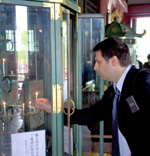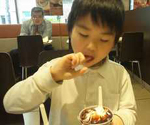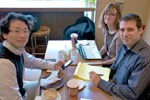|
By Dawn Brazell
Public Relations
As if the 12-hour flight from Detroit to Tokyo wasn't enough, there was
the earthquake in the middle of the night that woke up psychologists
Peter Tuerk and Matthew Yoder, and intern, Brian Hall. Not to mention
they were traveling with a Geiger counter and radiation dosimeters.
Not the best formula for a
good night's sleep.
 These peaceful scenes from Japan
were taken by MUSC psychologists who recently traveled there to provide
disaster mental health training. These peaceful scenes from Japan
were taken by MUSC psychologists who recently traveled there to provide
disaster mental health training.
What was, though, were the
300 kazoos and whistles that the experts in Post Traumatic Stress
Disorder (PTSD) had brought along. The toys were teaching tools to give
to therapists attending workshops to better be able to help people
hardest hit by Japan's magnitude 9 earthquake March 11. Tuerk,
associate director of the PTSD Clinical Team at the Ralph H. Johnson VA
Medical Center and assistant professor in MUSC's Department of
Psychiatry and Behavioral Sciences, said the natural disaster was a
triple whammy given the subsequent tsunami and radiation scare.
The toys were a reminder
of the value of letting children living in temporary evacuation centers
be children and to encourage normal activities such as play and
homework. Fears regarding personal safety and anxiety in recalling
traumatic events are common after natural disasters, but the important
thing is to not avoid normal everyday activities. It was one of the
main messages that the internationally-renowned researchers delivered
in trainings for parents, therapists and community leaders.
 Dr.
Peter Tuerk lights a candle at a Buddhist shrine for the victims. Dr.
Peter Tuerk lights a candle at a Buddhist shrine for the victims.
Part of a team invited to
go to Japan April 16 to provide disaster mental health training, the
psychologists met with students, community health workers and
professors at Tokiwa University in Mito, Japan. The team provided a
14-hour workshop training for students and therapists and a 2.5 hour
community education session (in Japanese, with translators) that was
attended by 140 community leaders, including police chiefs, school
principals and mayors. The community training was broadcast live on
national television.
Tuerk said the goal was to
provide education as a preventative measure against PTSD.
"When people don't have
their houses—when there is a high resource loss—their risk for getting
PTSD is much higher. So we're anticipating a lot of PTSD from this
event. It takes awhile for PTSD to develop. In that interim, while some
people might be developing symptoms, targeted education can help
prevent the disorder."
Tuerk and Yoder focused
the mental health worker's training on teaching about assessment and
screening, which is crucial following these events to identify the 10
to 20 percent of the population that typically is vulnerable to PTSD
following a tragedy. Yoder, also an assistant professor in MUSC's
Department of Psychiatry and Behavioral Sciences, assisted after
Hurricane Katrina and the Virginia Tech shootings, and he and Tuerk
also will be presenting materials in Alabama to help those recovering
from the storms.
Yoder said they had heard
that people in Japan might be more closed and reserved because of their
culture, but that they didn't find that to be the case.
 Dr. Matthew Yoder gets a photo
beside two Japanese shoppers beneath tsunami art. To see a video of the
Japan trip, visit http://bit.ly/MUSCJapan. Dr. Matthew Yoder gets a photo
beside two Japanese shoppers beneath tsunami art. To see a video of the
Japan trip, visit http://bit.ly/MUSCJapan.
"The people we trained
were very open to our being there. To me, this was a reflection of a
fundamental human desire to help in the face of suffering," said Yoder.
"There was a hunger, among the people we trained, to assist fellow
survivors, and we offered tools to do just that. Even though it felt
like a very different culture, we were able to connect in this way,
even in less than a week."
One touching story was
that of a mother who wanted to help her 7-year-old son, who had stopped
playing with his friends and avoided going outside. She came to them
for advice, and Tuerk worked with her to develop a plan of action. The
plan included stopping some of the avoidance behavior she was
re-enforcing, and getting her to coax her son to his favorite
restaurant, McDonald's, with the goal of staying there long enough for
his fear to go away. Since the child enjoyed origami, they made origami
birds while there.
 Afraid to go out after the
earthquake, this child got a reward for his first successful outing. Afraid to go out after the
earthquake, this child got a reward for his first successful outing.
The
outing, along with other non-avoidance strategies, worked. His grateful
parents sent a thank-you e-mail with a picture of their son eating so
much ice cream at McDonald's that he got a stomach ache.
Tuerk hopes to see that
healing scenario played out throughout the devastated areas in Japan.
"Hopefully, that one mother's experience will spread. She will tell her
friends, 'Go ahead and take your kids out' or 'Don't spend too long in
your family's earthquake safety room' or whatever the avoidance
behaviors are."
And it's not just the
mother they hope will be spreading the news, but everyone in the
trainings.
 Dr. Peter Tuerk, right, and Dr.
Sheila Rauch, from the University of Michigan, collaborate with Dr.
Nobukazu Nagae. Dr. Peter Tuerk, right, and Dr.
Sheila Rauch, from the University of Michigan, collaborate with Dr.
Nobukazu Nagae.
The trip also gave Yoder
and Tuerk the opportunity to hear the experiences Japanese therapists
are having with prolonged exposure treatment, which involves
intentional prolonged exposure to feared stimuli in a safe setting to
decrease anxiety. "There were more avenues to help than we originally
had anticipated because we are experienced in training and
disseminating that model," said Tuerk. "Similarly to the United States,
in Japan there are not enough mental health providers trained and
experienced in providing evidence-based treatment for PTSD. Hopefully
we might be a part of its positive spread."
Prolonged exposure
treatment helps a person's PTSD symptoms decrease with time. Yoder said
people suffering from PTSD don't do what others do naturally to heal,
which is to talk about the trauma and gradually resume regular living
patterns. They withdraw and don't want to talk or think about it. "We
help them stop the avoidance so the normal, natural healing process can
take place."
Because Tuerk and Yoder
have seen this type of therapy's effectiveness with veterans and other
trauma victims with whom they work, they feel strongly about being
advocates. One benefit that Tuerk was surprised to get from his Japan
trip was a boost of inspiration.
He saw therapists there
trying to do evidence-based treatment face the same institutional
barriers that therapists in America do.
"It affirms the value of
the hard work that we do every day—not in psychological practice—but in
administration, infrastructure building, policy work, advocacy and
education. These are the things that get evidence-based medicine and
evidence-based psychotherapy to suffering individuals. To see different
cultures struggling with the same issues helped put some gas in my tank
for the barriers here."
Education, collaboration
and research are powerful tools, though, he said.
"We have a great
internship that teaches evidence-based therapy. Most prolonged exposure
therapists become very strong advocates because they see its
effectiveness for PTSD. Here at MUSC, our psychology interns are
empowered not only to provide excellent care but also to do the
research to understand how behaviors and systems work, to push on and
expand the boundaries of effective care."
|



 These peaceful scenes from Japan
were taken by MUSC psychologists who recently traveled there to provide
disaster mental health training.
These peaceful scenes from Japan
were taken by MUSC psychologists who recently traveled there to provide
disaster mental health training.  Dr.
Peter Tuerk lights a candle at a Buddhist shrine for the victims.
Dr.
Peter Tuerk lights a candle at a Buddhist shrine for the victims. Dr. Matthew Yoder gets a photo
beside two Japanese shoppers beneath tsunami art. To see a video of the
Japan trip, visit
Dr. Matthew Yoder gets a photo
beside two Japanese shoppers beneath tsunami art. To see a video of the
Japan trip, visit  Afraid to go out after the
earthquake, this child got a reward for his first successful outing.
Afraid to go out after the
earthquake, this child got a reward for his first successful outing. Dr. Peter Tuerk, right, and Dr.
Sheila Rauch, from the University of Michigan, collaborate with Dr.
Nobukazu Nagae.
Dr. Peter Tuerk, right, and Dr.
Sheila Rauch, from the University of Michigan, collaborate with Dr.
Nobukazu Nagae.